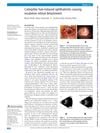 January 2024 in “Scientific reports”
January 2024 in “Scientific reports” Egyptian Mint effectively kills mosquito larvae and inhibits certain bacteria.

Recombinant human growth hormone helps burn wounds heal faster by increasing blood vessel growth.
 January 2024 in “Burns and trauma”
January 2024 in “Burns and trauma” The skin microbiome helps heal wounds and can be targeted to improve healing.
 January 2024 in “International Journal of Dermatology Venereology and Leprosy Sciences”
January 2024 in “International Journal of Dermatology Venereology and Leprosy Sciences” Patients with acne vulgaris have lower serum irisin levels.
 January 2024 in “Brazilian Journal of Veterinary Pathology”
January 2024 in “Brazilian Journal of Veterinary Pathology” The horse had a rare disease causing weight loss and skin issues, leading to euthanasia due to poor treatment options.
 December 2023 in “Journal of health and rehabilitation research”
December 2023 in “Journal of health and rehabilitation research” Oral Apremilast effectively treats alopecia areata in most patients.
 November 2023 in “Berkala Ilmu Kesehatan Kulit dan Kelamin/Berkala ilmu kesehatan kulit dan kelamin (Periodical of dermatology and venerology)”
November 2023 in “Berkala Ilmu Kesehatan Kulit dan Kelamin/Berkala ilmu kesehatan kulit dan kelamin (Periodical of dermatology and venerology)” A dermoscope helps accurately tell apart Pityrosporum folliculitis and Acne vulgaris.
 September 2023 in “Journal of Parasite Science”
September 2023 in “Journal of Parasite Science” The dog's skin condition improved significantly after seven days of treatment.
 September 2023 in “bioRxiv (Cold Spring Harbor Laboratory)”
September 2023 in “bioRxiv (Cold Spring Harbor Laboratory)” Freezing gamma-irradiated amniotic fluid may help hair growth and speed up the growth phase.
 September 2023 in “Frontiers in medicine”
September 2023 in “Frontiers in medicine” The mTOR signaling pathway is crucial for hair health and targeting it may lead to new hair loss treatments.
 August 2023 in “International journal of basic and clinical pharmacology”
August 2023 in “International journal of basic and clinical pharmacology” Herbal hair serum promotes natural hair growth and maintains healthy hair.
 August 2023 in “Research Square (Research Square)”
August 2023 in “Research Square (Research Square)” Two microRNAs affect hair follicle development in sheep by targeting specific genes.
 May 2023 in “Current Medicinal Chemistry”
May 2023 in “Current Medicinal Chemistry” Microneedle patches improve drug delivery for skin treatments and cosmetic enhancements.
 March 2023 in “Journal of Veterinary Medicine and Animal Health”
March 2023 in “Journal of Veterinary Medicine and Animal Health” The fly larvae infestation caused severe skin damage and health issues in Kenyan dogs.
 January 2023 in “Surgical & Cosmetic Dermatology”
January 2023 in “Surgical & Cosmetic Dermatology” Combining intradermotherapy with microneedling and a topical solution reduces hair loss more effectively than intradermotherapy alone.

Water and fatty acids affect hair's surface differently based on hair damage, and models can help understand hair-cosmetic interactions.
 July 2022 in “Research Square (Research Square)”
July 2022 in “Research Square (Research Square)” Lower PPARγ levels and specific gene variations are linked to more severe Frontal Fibrosing Alopecia.
 July 2022 in “BMJ Case Reports”
July 2022 in “BMJ Case Reports” Early treatment is crucial to prevent severe eye complications from caterpillar hair.
 June 2022 in “Asian Pacific journal of health sciences”
June 2022 in “Asian Pacific journal of health sciences” Ayurvedic treatments like bloodletting, herbal packs, and medicated liquid flow over the head are a safe and effective alternative for hair loss.
 April 2022 in “Research Square (Research Square)”
April 2022 in “Research Square (Research Square)” The combination of laser and topical steroids is more effective for treating alopecia areata than topical steroids alone.
 April 2022 in “Indian Journal of Forensic Medicine & Toxicology”
April 2022 in “Indian Journal of Forensic Medicine & Toxicology” PSA can help diagnose high androgen levels in women.
 January 2022 in “International Journal of Research Publications”
January 2022 in “International Journal of Research Publications” Griseofulvin effectively treats tinea capitis caused by Microsporum canis.
 December 2021 in “Molecular genetics and genomics”
December 2021 in “Molecular genetics and genomics” Cats with abnormal hair had DSG4 gene changes causing hair problems.
 November 2021 in “Journal of pharmaceutical research international”
November 2021 in “Journal of pharmaceutical research international” Herbal depilatories are safer and cause fewer side effects than chemical ones for hair removal.
 March 2021 in “Indian Journal of Case Reports”
March 2021 in “Indian Journal of Case Reports” A young woman with late-stage Vogt-Koyanagi-Harada disease was successfully treated at a hospital.
 January 2021 in “ACTA SCIENTIAE VETERINARIAE”
January 2021 in “ACTA SCIENTIAE VETERINARIAE” A dog with skin issues improved with prednisone after accurate diagnosis.
 November 2020 in “International journal of contemporary pediatrics”
November 2020 in “International journal of contemporary pediatrics” Two siblings had a rare immune disorder caused by a FOXN1 gene mutation.
 October 2020 in “Veterinary Dermatology”
October 2020 in “Veterinary Dermatology” New treatments and diagnostic methods for various animal skin conditions showed promising results.
 April 2018 in “Asian-Australasian journal of bioscience and biotechnology”
April 2018 in “Asian-Australasian journal of bioscience and biotechnology” The study concluded that tick infestation was the most common skin problem in hospitalized dogs in Chennai, with various treatments used for different conditions.
 January 2017 in “Springer eBooks”
January 2017 in “Springer eBooks” The document concludes that scalp health is influenced by complex factors affecting sebaceous glands, including hormones, aging, and various substances.





























